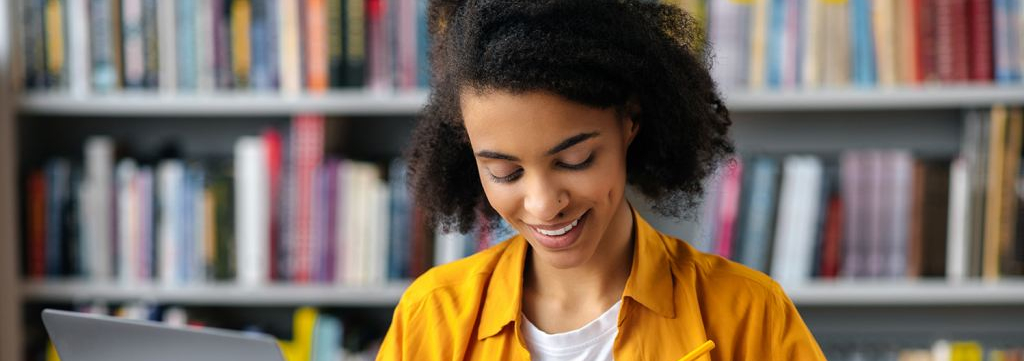2025-26 Common App Essay Prompts
The Common Application has announced the personal statement essay prompts for the 2025-26 admissions season.
Updated: Wednesday, August 27, 2025

As a 12th grader applying to college this fall, you have put in three years of hard work throughout high school and now it’s time to tell that story when applying to college.
Join IvyWise college admissions counselors Juaquin, formerly of Occidental College, and Judy, formerly of Georgetown University, as they share tips on how to showcase your best self when applying to college. Juaquin and Judy will explain how to:
By IvyWise College Admissions Counselors
It’s one of the most critical, confusing, and stressful parts of completing the college application process: the personal statement. As a component of the Common Application, the personal statement gives students the most control and the best opportunity to let the university get to know a little more about them. The predetermined prompts are broad enough that students can write about whatever they want — as long as it relates to their chosen essay question.
How to Write a Personal Statement with Examples: Table of Contents
The personal statement is an important part of the admissions committee review process. This essay is short but impactful, allowing the admissions committee to get to know more about you beyond your grades, test scores, extracurriculars, and recommendation letters.
It should provide a compelling narrative that expresses your authentic voice and helps the committee understand who you are and how you would contribute to the campus community. Other parts of the college application don’t provide much insight into your personality, which is why the personal statement matters.
When students think about what it takes to get into college, the first thing that usually comes to mind is good grades and test scores. While those “hard factors” are critical, the college application evaluation also takes into account “soft factors,” or the application elements that aren’t so easily quantified — like essays, recommendations, extracurricular activities, and more. The essay is the most important soft factor that colleges consider, according to NACAC’s State of College Admissions report.
The personal statement, when used properly, can give admissions officers additional insight into who a student is as a person, what motivates them, and, more practically, how that student communicates and follows directions. An amazing personal statement isn’t going to guarantee admission, but it can positively impact a student’s application, while a poor personal statement can really hurt a student’s chances of getting in. This is why college essays matter and shouldn’t be taken lightly. Students need to put a lot of effort into writing a great essay to enhance their chances of admission.
A personal statement typically consists of three main parts:
Each part should flow naturally into the next, creating a cohesive and compelling narrative that effectively showcases your qualifications and interests.
Asking yourself the following questions can help you reflect on your experiences, motivations, and goals to create a compelling and personalized narrative:
1. Why am I interested in this field? What experiences sparked my interest? Have I had any defining moments that solidified my decision?
2. What are my long-term career goals? How does earning a college degree align with those goals? What do I hope to achieve in the future?
3. What are my relevant experiences and achievements? What academic, professional, or personal experiences have prepared me for college? What specific skills or knowledge have I gained from these experiences?
4. What unique qualities or perspectives do I bring? How do my background, culture, or personal experiences contribute to my perspective? What sets me apart from other applicants?
5. How have I demonstrated commitment and passion for this field? Have I participated in relevant extracurricular activities, volunteer work, or research? What projects or initiatives have I been involved in that show my dedication?
6. What challenges or obstacles have I overcome? How have these experiences shaped my character and resilience? What lessons have I learned from these challenges?
7. What contributions can I make? What unique perspectives or skills can I offer?
Reflecting on these questions can help you gather the content and focus needed to write a compelling and authentic personal statement.
Don’t rush the process of writing a personal statement. It can be intimidating — especially since the admissions committee is your audience — so allow yourself plenty of time to draft and revise. These six tips can help college-bound high school seniors write a great personal statement essay.
We say this every year because it’s one of the essay tips students struggle with the most. In an attempt to show a specialty or passion, students can often be redundant and spend the length of the essay reiterating something else that’s already in the application. If marching band is on your activity list, the college already knows you enjoy music, so don’t spend your essay writing about what it means to play flute in the band.
Take this opportunity to give the admissions office insight into something new about you. Whether it’s how your religion impacts your education, how a mentor helped you realize your potential, or an event that’s shaped who you are today, write about something with substance that adds another dimension to your application.
To reveal something new about yourself, choose a meaningful and original essay topic. While the Common App essay questions are helpful, it’s up to you to choose a personal topic that ties in with the Common App prompt you’ve selected. Take time to think about what’s important to you, what people or events have shaped you, and what you think is interesting about yourself.
Don’t just choose the most obvious topic, like the soccer team captain writing about winning the championship game. Instead, think of events, themes, life experiences, and more that are somewhat unique to you and how they’ve impacted you. Investing in brainstorming is key to writing a stellar personal statement.
The topic you ultimately choose must make for a strong narrative. To give you an example, Robin, an IvyWise college admissions counselor, shares what she wrote about in her personal statement.
Your essay should sound like you wrote it, so avoid this college application mistake and don’t overload it with long vocabulary words, complex sentence structure, or a lofty tone if that’s not how you normally write or speak. However, don’t be afraid to stretch your writing skills.
The personal statement should demonstrate your best writing, so take your time to carefully craft an essay that clearly conveys your story and your voice. Avoid redundant words or phrases, filler words that don’t add any value, or confusing language that muddles the message.
It’s rare that anyone’s first draft is the perfect personal statement. Just like with anything else, you get better with practice. Write often, whether in a journal, blog, or another outlet, to improve and evolve your writing skills. When it comes time to pen your personal statement, practice that, too. Revise, revise, and then revise again. It often takes students many drafts before they have a personal statement that demonstrates their best writing and clearly conveys the essay’s message.
A stellar essay isn’t usually written in a day. We advise students to get a head start on their personal statements by brainstorming topics and writing the first draft as early as the summer before the school year starts. That way, some of the most difficult work — choosing a topic and starting the writing process — is done before you head into a hectic senior year.
However, we realize this isn’t always the case for students. No matter where you are with your personal statement, don’t wait to get feedback or help from your college counselor. The earlier you can get this essay done, the better!
Your personal statement is an opportunity to expand on your skills and experiences. Weave these details into your narrative — how you developed and honed these skills and how they helped you personally and professionally. Did you learn more personal responsibility? Did you gain more self-confidence? Did you realize that you are a natural leader? These are all details you can include.
These are just a few tips that can help you get started with writing a great personal statement. Remember, be yourself and write about what’s important to you — not what you think the college wants to read.
IvyWise counselors Rachel and Zach share their top tips on how to brainstorm and write college application essays, and what admissions officers are looking for when they read them on the Just Admit It! college admissions podcast. Listen now to learn how to brainstorm and write college essays and what admissions officers are looking for when they read them.
An effective personal statement introduction contains a “hook” — an opening that grabs the reader’s attention and sets the tone for the rest of your essay. Here are some ideas to get your creative juices flowing:
A compelling introduction provides a glimpse into your motivations and personality and tempts the reader to want to know more.
Like your high school essays, the body of your personal statement builds on the idea or theme you presented in your introductory paragraph.
Each paragraph should begin with a clear topic sentence that introduces the main idea of the paragraph. It’s important to keep in mind that your topic sentences should support the overall theme or idea from your introduction.
The admissions committee wants to get to know you, so don’t be afraid to write about your life in detail. Describe what you did, how you did it, and the impact of your actions. Specific examples make your personal statement more engaging, authentic, and credible.
Explain the lessons you learned from your experiences and how they contributed to your personal and professional growth. For instance, detail how overcoming a particular challenge taught you resilience and problem-solving skills, and explain how these qualities helped you grow as a person.
Link your experiences to your goals by highlighting how your past achievements and challenges have prepared you for the academic and professional path you aspire to follow. For example, describe how your participation in a high school science club fueled your passion for biology and inspired your goal to pursue a career in medical research.
Ensure each paragraph flows logically from one to the next, reinforcing your central theme. Use clear transitions and consistently relate your experiences and goals back to your overarching story, creating a seamless and engaging progression from your introduction to your conclusion.
Write like you speak. Don’t use vocabulary you wouldn’t normally use or stuff your essay full of words you think will impress the admissions committee. That said, your essay should also be relatively free of grammar, spelling, and punctuation errors — though you aren’t expected to be perfect.
Ideally, you want your personal statement to make a lasting impression on the admission committee. A strong conclusion connects to the beginning of your essay, reinforces your key points, and makes the case for why you should be admitted. Check out the personal statement samples below from our IvyWise students for inspiration.
College admissions committees value authenticity and uniqueness, which is why we do not recommend using ChatGPT for essay writing — AI tools lack the personality and emotional intelligence that should shine through in your personal statement. That said, ChatGPT and other AI tools can provide suggestions and help you generate ideas. Your essay is an opportunity to highlight what makes you special — not to mention, it shows off your written communication skills. So, if you use these tools at all, use them sparingly.
These examples of good personal statements come from IvyWise students. Each responds to a different personal statement prompt on the Common App and provides insights into themselves that wouldn’t appear elsewhere in their applications.
Reflect on a time when you questioned or challenged a belief or idea. What prompted your thinking? What was the outcome? (650 words max)
“What is utopia?” Dr. Cohen challenged my junior-year English class while we discussed Chang-Rae Lee’s dystopian novel On Such a Full Sea.
“A world without poverty and war!” “No discrimination or injustice!”
“A four-day school week!”
As my classmates described their “perfect” worlds, I struggled for my own. In Qingdao, my home until I was eight, I’d been taught that the People’s Republic was the ideal society. Yet, the surveillance cameras in our classrooms defied a sense of freedom, and the songs we recited at assembly praising the Party felt mechanical and forced. When my family moved to California, I anticipated a freer, more just country, but disappointment followed. A sixth-grade classmate asked how I could see through my slanted eyes; our neighbors mimicked my mom for saying “sanks” instead of “thanks;” and last year, I encountered threats of censorship when I submitted a newspaper article about microaggressions against students of color.
As I sat in Dr. Cohen’s class mulling over these thoughts, I couldn’t hold back. I raised my hand. “Utopia doesn’t exist,” I stated firmly.
Sir Thomas More titled his paradisical satire from the Greek word ou-topos, which literally means “no place, nowhere,” and I was beginning to understand his irony: How could utopia exist in a world plagued by so much injustice and distrust? Because we humans are imperfect, I rationalized, no place inhabited by us could ever be perfect. In fact, all the authors we had explored in class–Atwood, Orwell, Ishiguro–affirmed this grim reality.
I am, by nature, an optimist, so for days after the utopia dilemma, I was bothered by my unexpected cynicism. Struggling to formulate a universal truth that would define the perfect world, I pored over utopian philosophies–those of Plato, St. Augustine, Owen. As I sought an answer, I found myself drawn to moments in my own life: cooking baozi with my grandmother, sharing sugar cookies with fellow newspaper staff during Saturday layouts, singing Adele’s hits with my mom driving home with fresh strawberries from the farmers’ market, and laughing hysterically with Kate and Ben while watching our mockumentary about Halloween. Though these moments weren’t documented in treatises, they were my utopias, my souvenirs of unblemished happiness.
But how could my everyday moments possibly approach the grand worlds posited by renowned philosophers? My utopias didn’t fit the model of the detached island that More had envisioned; my idylls depended upon close relationships and camaraderie, not solitude. Nor did my visions of ideal existence involve the propaganda and censorship upon which Plato’s Kallipolis was founded; my utopias rested on honesty, compassion, and companionship. Connection, I reasoned, is essential to utopia because our very nature is relational, a deep longing within each of us to seek the comfort of another.
I realized then that utopia isn’t one place or condition; it’s every small moment of engaging with others, of feeling known and letting others know they too are seen and understood. It’s not just gathering for celebration; it’s bolstering during injustice, sharing over grief, forgiving despite betrayal. It was marching with fellow Black Lives Matter protesters, mourning with my childhood playmates when our friend Kairan died, forgiving Anna for divulging my secret, and Anna’s forgiving me for divulging hers.
In class, I’d vehemently agreed with More that utopia existed nowhere. I recognize now that it can–it must–exist everywhere, especially in a challenging world where sometimes all we have is each other.
I’m still convinced there is no perfect world; I’m not sure it was even fair for me to expect one when I know that I myself am far from perfect. But my acceptance of human flaws, including my own, has not diminished my optimism. Instead, I’ve become even more determined to create for myself and others those special moments that give life meaning and purpose.
This essay stands out because the student demonstrates their ability to think critically, question their own beliefs, and come to a new understanding about themselves. The student provides a window into their personality, and their experiences as an ethnic minority helps the admissions committee understand the diverse perspective this student can contribute to the campus community.
Share an essay on any topic of your choice. It can be one you’ve already written, one that responds to a different prompt, or one of your own design. (650 words max)
As a sailor, I revel in the piercing wind, the sound of my boat tearing through the water, and the periodic ice-cold splashes in my lap. But my head is always filled with questions. Why do we set the sail at certain angles? To find the answer, I went home and filled my beloved chalkboard with trigonometry and calculus, deriving that the sail’s optimal angle is half the bow’s angle to the wind. And how does a sailboat sail? Bernoulli’s principle in AP Physics answered that.
For as long as I can remember, I’ve learned best by asking questions and exchanging ideas. A simple question can lead my mind to go out for a stroll… and fall down a rabbit hole, like the one I found myself in during an elective on Nazi Germany. Every few sentences I read sparked a question to Google: What was the history of IG Farben? What obscure facts can I learn about Berchtesgaden? This happens with everything I read; when I need to move on to other work, I create a long list of questions to research later. Every answer sparks more questions and more articles saved in open tabs, running me up against the 500-tab limit on both web browsers on my phone. To paraphrase JFK: As my knowledge grows, my ignorance unfolds.
But seeking answers goes beyond gathering information. In Mock Trial, my moral and political views often lead me to quickly conclude which side is “right.” Building two opposing arguments, arguing passionately for both, and asking questions to poke holes in my own arguments allows me to understand different perspectives. I’ve learned that no issue is as clear-cut as it seems. For example, I always saw student debt as a matter of personal responsibility. Then a conversation with my English teacher while on a field trip made me waver. Hearing about the weight of her monthly payments and her struggles to make ends meet, I saw that the student debt crisis requires a societal response. She dedicated her life to teaching students like me, and I was benefitting from her burden. I now find myself interested in questions with purpose: How do issues like student debt impact people’s lives? What can be done about it?
Such questions about morality and effectiveness are at the heart of policy discussions. I’ve seen how policy questions affect real people, whether I’m talking to voters about the Cincinnati streetcar while working on a local campaign, writing about the national abortion debate, or advocating for STEM education funding on Capitol Hill. How should Cincinnati spend its transportation budget? What is the best way to bring robotics programs to disadvantaged communities? Asking such questions and hearing different perspectives is critical to crafting effective policies.
To inform my opinions on difficult questions, I absorb viewpoints from opposing sources and debate (often vigorously!) with my friends and family. I scrutinize problems with arguments in publications that align with my beliefs and carefully consider good points by authors I typically disagree with. I dive past the political zealotry tied to Supreme Court rulings, reading law review articles and referencing my course notes from Justice, where I read Kant, Mills, and Rawls. Using these resources, I examined the legal and moral questions around the 2021 case Cedar Point Nursery v. Hassid, writing an article weighing employers’ property rights and unions’ rights to organize workers. But not all questions are weighty: I love bickering with my best friend about whether Shakespeare was better than Marlowe (he was) or arguing with her over which Star Wars movie is best (clearly, The Force Awakens, not The Empire Strikes Back).
Asking questions forces me to think, leading toa deeper understanding. While some questions are trivial, the answers are always interesting. More importantly, the answers to some questions can meaningfully impact people’s lives. This is what motivates me to keep learning, keep debating, and keep questioning.
This essay demonstrates the student’s critical thinking skills and what motivates them to learn both in and out of the classroom. The main idea flows seamlessly throughout the essay, from topics that pique the student’s interest in class to social and political issues and activities that inspire them to question, debate, and understand. It gives the admission committee a good idea of how this student will contribute to the class and the wider campus community.
At IvyWise, our team of former admissions officers works with students to help them brainstorm and identify compelling personal statement topics, provide feedback on essay drafts, and more. Our college counseling services and strategic admissions support can help you stand out in all aspects of your application.
Just looking for help with your personal statement? We offer customizable programs to fit your specific needs, goals, and budget, including smaller programs focusing on your college essay. Contact us today for information on our counseling services.
UCLA Personal Statement: FAQ, Examples & Insider Tips
Defining Your Personal Statement for Medical School Applications
College Prep Resources for High School Students
How to Write a College Application Essay That Makes an Impression
Spring Into Self-Expression: Developing Your Writing Voice Through Journaling

Finalizing your list of best-fit schools is one of the most important steps of the college application process. Between writing supplemental essays, finalizing personal statements, and requesting letters of recommendation, there’s a lot that students need to prioritize – and often, they put off the difficult task of narrowing down their long list of best-fit schools. Keep reading to learn more about what you should keep top of mind so that you can narrow down your college list and stay ahead of the game on all of your applications.

How Important are Supplemental Essays?
We all know the personal statement is a huge part of the college application, but how important are those extra supplemental essays? For many students writing fatigue can set in and they don’t spend as much time working on those – especially as application deadlines loom. So how important is it to spend time on those supplements?

Your personal statement for medical school is simply an opportunity for you to convey to an admissions reviewer: Why medicine? Remember, medicine is a helping career, and you will want to communicate what is unique about being a physician that you feel that you cannot find the same satisfaction in other helping professions such as a teacher, firefighter, minister, or counselor.